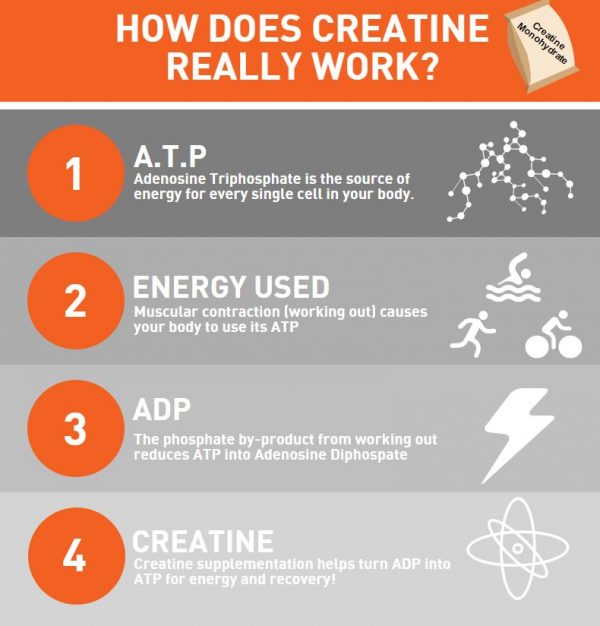Creatine is, in my opinion, one of the biggest puzzles for many athletes. Anyone who has been in the gym for more than four weeks knows proverbs like: “He’s on creatine ?!”..
Most of it is complete nonsense!
That is why in this article you will learn all about creatine you need to know!
Creatine is an amino acid. Strictly speaking, it is not an amino acid but three, so a tripeptide. These three amino acids are glycine, L-arginine, and L-methionine. For everything you do, run, think, even sleep, you need ATP.

In short, creatine works by simplifying the body’s own ATP (adenosine triphosphate) production, which serves us as an energy source.
Due to this effect, creatine is a sensible dietary supplement, especially for competitive athletes. However, as the body does not need ATP exclusively for physical activity, creatine can also be a great benefit to non-athletes.
Creatine is probably one of the best-known supplements besides Whey Protein. Fortunately, it is also one of the most widely studied supplements.
Everything you need to know about creatine is explained below.
What is Creatine Monohydrate?
As already mentioned, creatine is not exactly an anemic acid but a tripeptide, which is composed of three amino acids. These are glycine, L-arginine, and L-methionine.
Creatine is also naturally produced by our body between 1-2g a day. Among other things, this is converted into ATP, i.e. pure energy, and the residual products are eliminated. So, it is never really “stored” in the body.
In addition, you can find creatine in a variety of foods such as red meat (beef), deer as well as in various fish species.
Taking creatine gives the body more creatine phosphates. The creatine phosphate simplifies the body’s production of ATP from ADP (adenosine diphosphate) by releasing a phosphate group. ATP is the body’s own energy supplier.
By taking creatine, the body and thus the muscles have more energy available.
What is the effect of Creatine on muscle growth?
Contrary to the assumption of many strength athletes, creatine has no direct effect on muscle growth.
Although it is often said that a few days after the start of creatine supplementation sees significant progress in muscle growth, that’s not really true.
Among other things, creatine leads to increased water retention in the muscle. This is especially noticeable at the beginning of the intake. Of course, it increases the volume of the muscle and makes them look bigger, but to call this muscle growth is wrong.
The indirect impact on muscle growth, however, is much more important. The above-mentioned increased or simplified provision of ATP for the muscle, on the one hand, enables you to work harder and on the other hand to exercise longer.
This will allow you to put more exercises or sets in your workout than ever before. Of course, this will then also have a positive effect on muscle growth and your strong values.
Studies show significant differences in muscle growth between strength athletes with creatine supplementation and the control group. This means that creatine can definitely be beneficial for building lean muscle mass and therefore muscle hypertrophy.
In short,
- Increases strength
- Increases muscle endurance)
- Increases muscle volume

Should I take creatine?
Creatine is no miracle! Muscle recovery and overall muscle performance are estimated to increase by only about 3-5% through the intake of creatine. However, this is still a significant improvement.
A study on marathon runners has shown that creatine makes sense, especially after heavy workloads, as well as after a hard workout.
Especially for strength athletes, creatine is an advantage. By supplementing Creatine, the muscles have more energy available. Creatine, therefore, has less effect on increasing your maximum weight, but rather on making the last two reps of each set easier.
Endurance athletes, such as long-distance runners or marathon runners can benefit from creatine. When you run out of power towards the end of a run, creatine can deliver the extra power you need. Studies also show that creatine improves the performance of sprinters even in the 30 seconds range.
Since increased energy supply is useful in just about any sport, supplementation of creatine is likely to benefit any athlete.
ATP is not only important for athletes, but creatine is also a useful dietary supplement for non-athletes.
An advantage of creatine, which also benefits non-athletes, as a study from the University of Kentucky shows, is that creatine, by raising the ATP levels, also has a positive effect on the ability to concentrate.
Another study by the University of Santa Catarina indicates that dopamine and serotonin levels can be increased by supplementing creatine. Thus, creatine may well be attributed to a depression preventative effect.
Creatine thus offers the following advantages:
- Ideal for strength athletes of all kinds
- Ideal for marathon runners
- Ideal for Sprinters
- Improves concentration
- Can prevent depression
How much Creatine should I take?
How much creatine you should eat cannot be answered at a flat rate. There are different approaches to creatine supplementation, the two best known “Fast Load” or “Slow Load”.
Fast Load: A lot of creatine is taken in a very short time. So this approach is a bit more aggressive than the slow load and therefore less popular. In theFast Load, you start with a very high dose of about 20g per day. This 20g should be distributed throughout the day. The best with 4-5 meals.
It is advisable to take a carbohydrate-rich meal for creatine intake in order to ensure the ideal transport in the body. Otherwise, you should just be careful to take the creatine together with a few grams, ideally, short-chain carbohydrates such as glucose or maltodextrin. Fruits or a banana also work great.
This 20g should be taken over a period of 5-7 days. This completes the so-called “loading phase”. After the loading phase begins the “maintenance phase”. The maintenance phase can be between 2 and 12 weeks, depending on your preference. Here only 3 – 10g creatine is taken a day. Depending on the dose, the intake should also be divided here to 2-3 meals, again in conjunction with carbohydrates.
This is the Fast Load actually finished, it is recommended after at least 3-4 weeks to take no creatine before re-starting a cure.
The Slow Load approach is much more popular nowadays as it is not as aggressive as the Fast Load.
In the Slow Load a distinction is sometimes made between the loading phase, the maintenance phase, and the settling phase.
But we simply recommend a continuous intake of 5-10g creatine daily. This should be taken as in the Fast Load distributed to about 3 meals. Or just in connection with some kind of carbohydrates.
When should I take creatine?
As already mentioned, especially with a high intake of creatine, supplementation should be divided into several meals.
The ideal is approx. 3-5g at a time. This ensures optimal absorption of creatine in the body and thus achieves the desired effect.
However, a study by the Journal of the International Society of Sports Nutrition shows that creatine should be taken mainly after exercise. This is because ATP, energy, is needed at this particular time. In itself very logical, in training, a lot of energy is burned, so then the creatine becomes most necessary.
You can simply mix the creatine after a workout directly with a protein shake.
I recommend adding about 5g of creatine to your shake.
Another option is to take it right before your workout. This ensures ideal energy intake during exercise.
What Type of Creatine is Best?
There are now a variety of different creatine types.
The best known and probably the purest is creatine monohydrate. But there are other types. These are, for example, tri-creatine malate, creatine gluconate, creatine ethyl ester or creatine HCL.
Among other creatine derivatives such as Kre-Alkalyn. However, an effect as effective as creatine monohydrate has not yet been proven for Kre-Alykalyn, so just stick to normal creatine.
If you are looking for a more standard creatine, creatine monohydrate is very good for you. Here, however, should be paid attention to the purity of the product, otherwise, it can quickly lead to side effects such as impure skin or the like.
Does creatine have side effects?
Does creatine have side effects? Generally speaking, no.
Creatine has no side effects. Some feel a little bloated in the habituation phase of the first few weeks, but that’s about it. The only thing to watch out for is to drink enough water as more water is absorbed into the muscle through creatine.
As already mentioned, creatine leads to increased water absorption by the muscle, therefore, an increase in muscle volume can be expected.
Conclusion Creatine
All in all, creatine offers a variety of benefits with no real side effects at all. That’s why I recommend supplementing with creatine for almost every person.
Even if you are not an Athlete (yet), creatine will offer you benefits.
Still, do not get fooled by wrong promises of many supplement companies appraising creatine as if it works wonders – it does not.
So, will you consider taking creatine?
Cheers,
Sam




